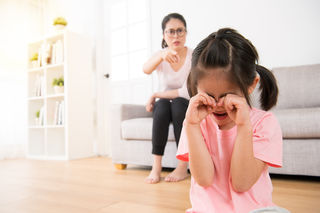Fantasies
Parental Expectations: The Helpful and the Harmful
A necessity that requires attunement.
Posted April 8, 2020 Reviewed by Jessica Schrader

While teaching a parenting class to a group of counseling students, the question came up whether parental expectations were ever a good thing. The consensus in this class of young adults was that parental expectations have a debilitating, shaming effect on children with emerging identities. And yet, parental expectations also have the benefit of encouraging children to develop their abilities. The answer to this dilemma might lie in whether the expectations emerge out of the parents’ attunement to their child’s unique interests, tendencies, and temperament.
As parents, we can’t escape having expectations. From the moment we find out our child’s sex, we start to imagine what they will be like. Finding out we are having a boy may bring fantasies of playing catch in the backyard or attending their graduation. A girl may lead us to fantasize about encouraging her to develop into a strong and independent woman. The truth is that we often find ourselves welling up with pride even before they open their eyes for the first time. We just can't help ourselves!
The Helpful: A Sense of Belonging, Encouragement, and Guidance
Expectations communicate to our children that what they do is important to us, what they do matters—a lot! These expectations let our children know that we are narcissistically involved—that, in a sense, they are experienced as a part of us—they matter to us as much as we do to ourselves. This gives children a profound sense of belonging. Our hopes for their future are inextricably linked to our hopes for our own future.
When parents are too accepting of whatever their child does, it communicates that the child does not really matter. Children know this because when something that matters to them goes awry, they get upset. So, it is not a leap to assume that we don’t get upset because we don’t really care.
Our expectations encourage our children’s development. When my daughter was 3 months old, I would already find myself standing her up on my belly whenever I was lying down. She was delighted with the new perspective, but my expectations were clear. I couldn’t wait until she could stand and walk on her own. Similarly, we talk to our children long before they understand words with the implicit expectation that one day they will be able to talk—and, in fact, talking to them helps them learn to talk.
Our expectations also help our child forge a path, avoiding the potential pitfalls of growing up. It lessens the number of overwhelming choices that confront their young minds. For example, if the expectation is that our child will go to college, it can be experienced as our confidence in their abilities, encouraging them to stick with their studies when they are struggling. Not having the option to give up can be an amazing motivator.
The Harmful: A Sense of Being a Disappointment, Low Self-Esteem, and Shame
Parental expectations are harmful when they are not based in our attunement to our children. When our fantasies about our children do not coincide with their interests, talents, and tendencies, our expectations can strike a debilitating blow to our children’s development.
Children develop a sense of themselves from how they are experienced by their parents. Parental joy in their children allows children to experience themselves as inspiring joy. When parental expectations are not met and parents feel disappointed, their children internalize a sense of themselves as being a disappointment.
When the disappointment is something that can be remedied without having to compromise their own identities, children can feel motivated to try harder. When what is expected is not among their talents, parental disappointment can be devastating. A child with no musical talent who is expected to excel at it will develop a chronic sense of low self-esteem.
When the parents’ expectations directly contradict how children experience themselves, children may hide parts of their identity. They assume a false identity in order to appear to conform to their parents’ expectations. For example: Lesbian or gay children who are expected to be heterosexual or conform to traditional gender roles may find themselves denying this fundamental part of themselves for the sake of parental approval. These children grow up with a deep sense of shame at their very core.
Dealing With the Loss
Parents inevitably suffer the loss of some of the hopes and dreams they had for their children. Accepting these losses and mourning them opens our eyes to what we can celebrate about our children. Being mindful of our child’s unique interests, talents, and temperament situates our children in their rightful place at the center of parental concern and informs the necessary parental expectations.




